COMMENT | After the much-awaited abolition of the Anti-Fake News Act, the Pakatan Harapan government has revealed that it will formulate a Freedom of Information Act (FOIA), another electoral promise made by the ruling coalition in its manifesto.
This is indeed a good start. However, to achieve significant progress in terms of transparency and public participation in the governance process, as stressed by Communications and Multimedia Minister Gobind Singh Deo earlier this month, attention and resources should be given to another pillar of a transparent government - an open data policy.
FOIA and open data belong to a policy package that forms the foundation of an open government. Although FOIA gives citizens the legal right to access government information, it works in a passive manner - people have to ask for the information by themselves.
Open data works in the opposite way. It requires the government to make information public and easily accessible. Open data is data that can be freely used, re-used and redistributed by anyone.
In the past decade, open data has become a global trend thanks to former US President Barack Obama. His very first presidential memorandum issued back in 2009 when he first took office was one that required the government to be transparent, participatory and collaborative.
The memorandum (photo), issued on the second day after he was sworn in, declared that "information maintained by the federal government is a national asset" and pledged to "take appropriate action, consistent with law and policy, to disclose information rapidly in forms that the public can readily find and use".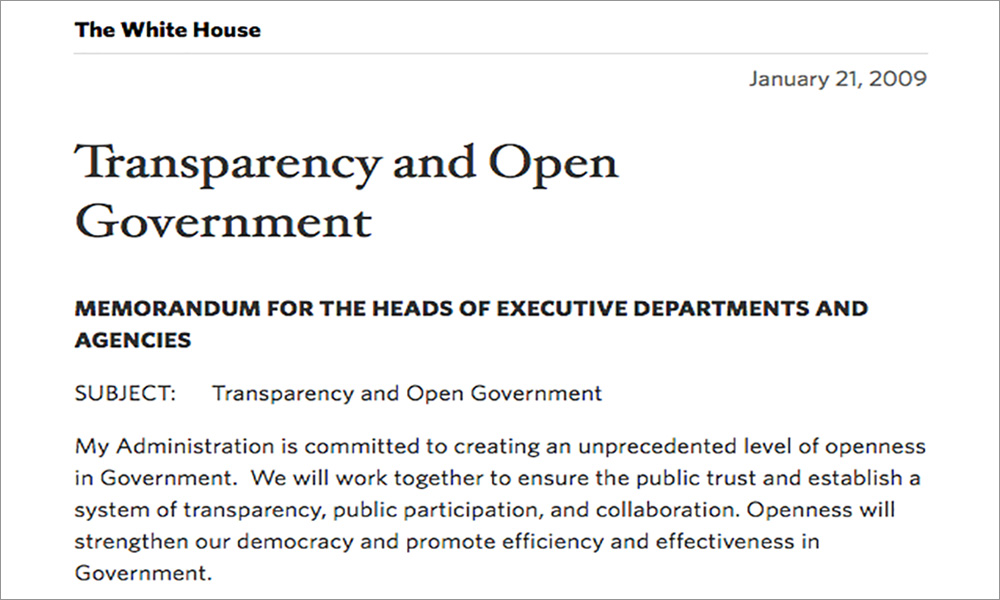
Four months after the memorandum was issued, the US federal government launched data.gov, an open data hub that hosts datasets made public by different public agencies.
In 2013, the first year of his second presidential term, Obama issued an executive order to update the US open data policy, making all government information open by default instead of by exception.
Whether it is federal government spending data or dog names in New York City, all government data has to be made public, except those that would jeopardise privacy and security.
The impact of the open data policy in the US caught global attention. It has improved government efficiency, accountability and public oversight.
It has increased public participation as citizens use open data to create applications that solve their problems and improve their lives. Businesses use open data to make better decisions while entrepreneurs use them to launch innovative services and products.
For example, Starbucks used demographic data on the number of local smartphone users to determine where mobile app discounts will be most impactful.
Flight tracking website FlightAware compiled public aviation data to provide flight tracking services, and Malaysiakini has used FlightAware data in its investigation into the use of a government jet by former prime minister Najib Abdul Razak's family for a holiday in Australia.
Following the US’ example, many more governments, both national and local, made open data a priority. Global open data standards were created, best practices were shared and studies were conducted to measure the impact of open data.
The economic value of open data was found to be tremendous. A study published by the European Union (EU) in 2015 estimated that in the five years between 2016 and 2020, open data would create a new market worth 325 billion euros (RM1.53 trillion) and 25,000 direct jobs in the EU region (photo).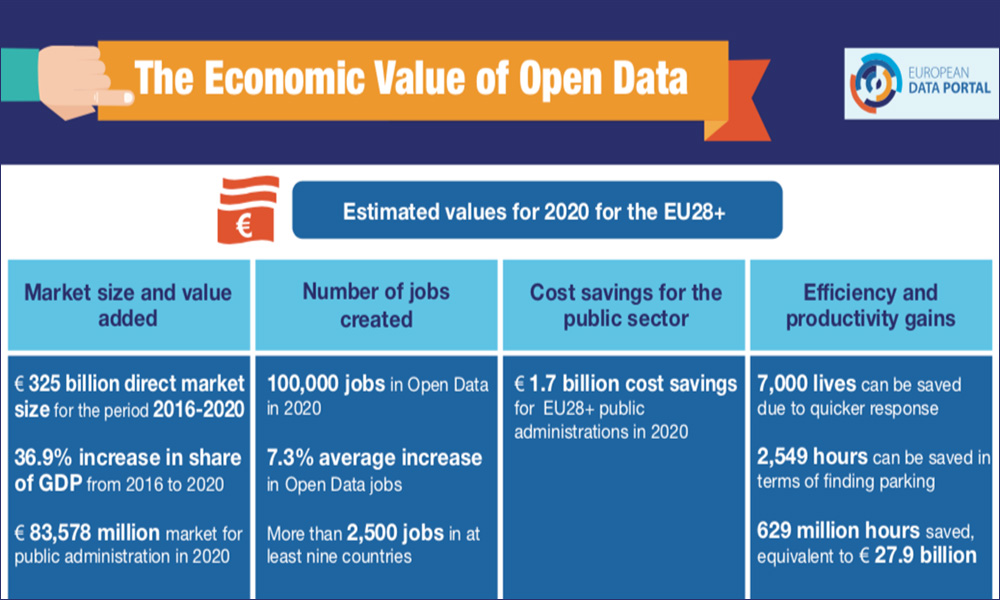
Benefits for Malaysia
Looking at the experience of other countries, there is no doubt that open data could change the lives of many Malaysians.
When Transport for London, a local government body responsible for the transport system in Greater London, started to open up its transport data in 2009 including live traffic disruptions, live bus arrivals and timetables, it never expected the data would be used in 362 smartphones apps by the end of 2014.
If such data in Klang Valley is made open, millions of hours of commuters' time could be saved because we would know exactly what time the next bus would arrive or if an MRT train has been delayed due to disruptions even before we step out of our homes.
In Paraguay, researchers used dengue incidence data together with climatic, geographic, demographic and sanitation data that had been made public to create an early warning system that can detect outbreaks of dengue fever a week in advance.
On the other hand, there is no easy way to access past dengue data in Malaysia. The iDengue mobile app (photo) that was introduced by the Health Ministry a few years back is buggy and provides a terrible user experience.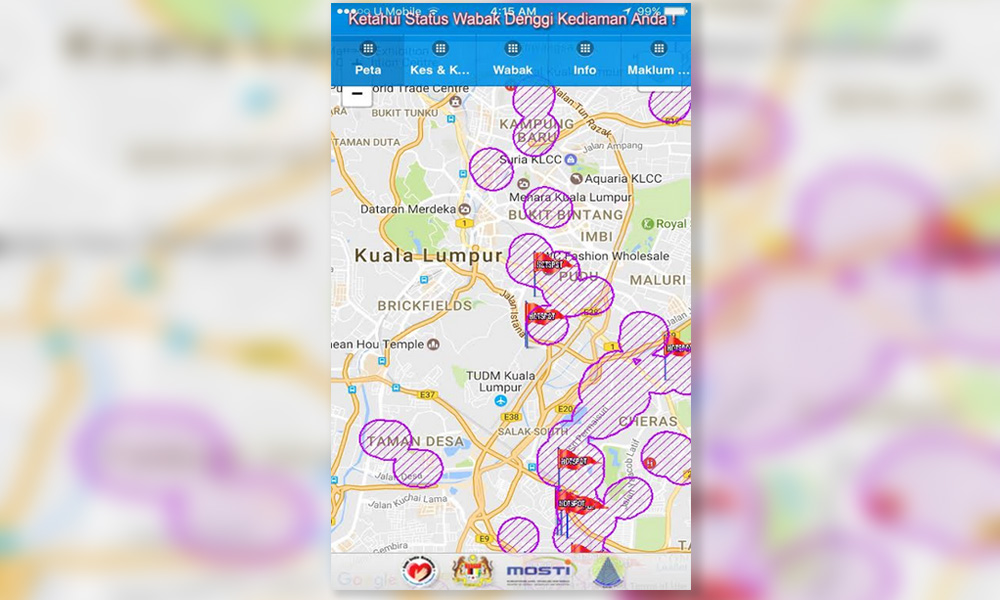
If dengue data were to be made public and updated in a timely manner, I believe both the nonprofit and private sectors would use the data to develop much better services for us.
Among others, we could have a mobile app that alerts us when we are within an area that has dengue cases, or property portals could include past dengue data in their property reviews.
Open data in Southeast Asia
Open data started to take root in Southeast Asia in 2011 when Indonesia and the Philippines joined hands with the US and UK to create the Open Government Partnership (OGP), a multilateral initiative to make member governments more inclusive, responsive and accountable through a concrete action plan that will be monitored regularly. Indonesia and the Philippines are the only two countries from the Asia Pacific among the eight founding members.
To become an OGP member, a government has to meet specific criteria including fiscal transparency, citizens’ right to information and asset disclosure by public officials. A scoring system was developed to measure each government against those criteria. Malaysia only scored 63 out of 100, failing to pass the minimum eligibility score of 75.
However, the Malaysian government refused to sit out the game.
The Malaysian Administrative Modernisation and Management Planning Unit (Mampu), an agency under the Prime Minister Department tasked to transform the civil service, launched our own online open data portal data.gov.my in 2014. It also sought the help of the Open Data Institute, a non-profit organisation that advises the UK government on open data policy.
In 2015, a circular on the implementation of open data by the public sector was issued by the Prime Minister's Department (photo) to all government ministries, agencies, state and local governments. It required them to make their data public and explained in detail how this should be done.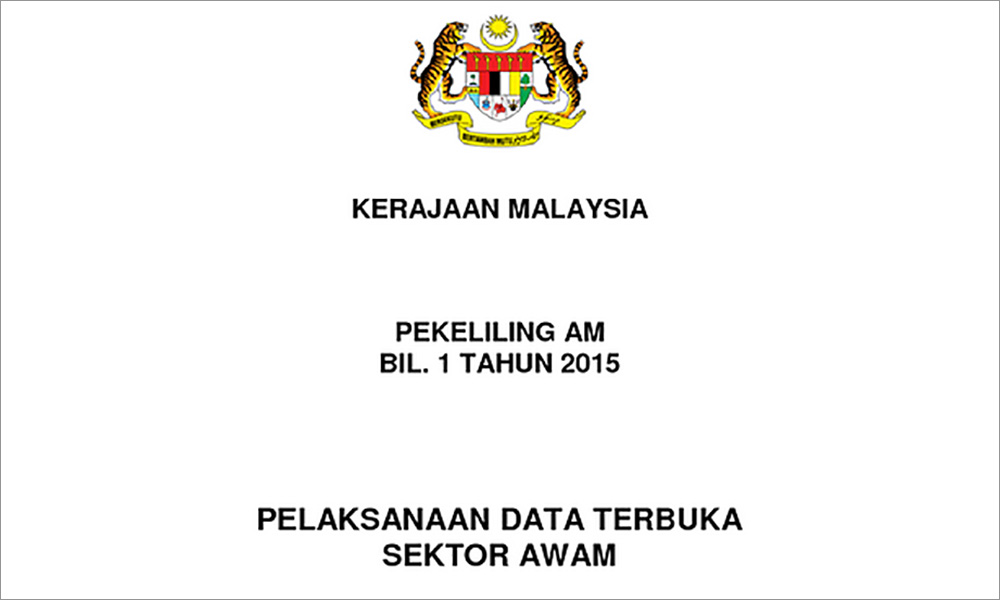
M’sia far behind
Despite the efforts, we are still far behind our neighbours. The Open Data Barometer, a global benchmark that measures countries’ progress on open data, ranked Malaysia 53rd out of 114 countries in its latest 2016 ranking, lagging behind the Philippines (22nd), Singapore (23rd) and Indonesia (38th).
Not only that, Malaysia's position has been sliding, from 41st in 2014, when the ranking was first introduced, to 51st in 2015 before reaching 53rd in 2016. Despite the continuous setback, the Malaysian government has set a target to be in the top 30 by 2020.
As a data journalist, navigating open data portals of different governments to scout for useful data is part of my daily tasks.
However, I can't say the Malaysian open data portal data.gov.my has made my life easier. It is like a pasar malam (night market) for government data.
Although it hosts almost 5,000 datasets from various public agencies, they are all scattered around in the portal without proper organisation. Many datasets lack metadata (information about the dataset itself) and consistency in their format, and they are not updated punctually.
For example, the Air Pollution Index (API) data for various towns on data.gov.my were only updated until 2017. The data, ranging from 2003 to 2017, are split into 19 different datasets.
The dataset with only 2016 API data includes the state and the time the reading was taken, while the 2015 dataset does not list either state or time.
Both datasets have different date formats. Both give you the exact location of the air monitoring station, but the other datasets only give you the areas.
It would take hours to manually standardise all datasets before further analysis could be conducted.
World Bank assessment
Our poor performance probably prompted Mampu to engage the World Bank in 2016 to conduct an Open Data Readiness Assessment to identify areas need to be improved.
The assessment report published last year found that Malaysia has built a data-rich environment but there were two major flaws in the implementation of our open data policy: Lack of a clear policy/legal framework that determines whether data can be opened, and resistance among data-owning agencies to release data in a timely and effective manner.
The report further suggested that Malaysia require "a high level of national leadership to achieve consensus across government agencies on the scope of legislative, regulatory, and/or policy changes that need to be made to turn open data into a practical reality and regular occurrence for data users large and small".
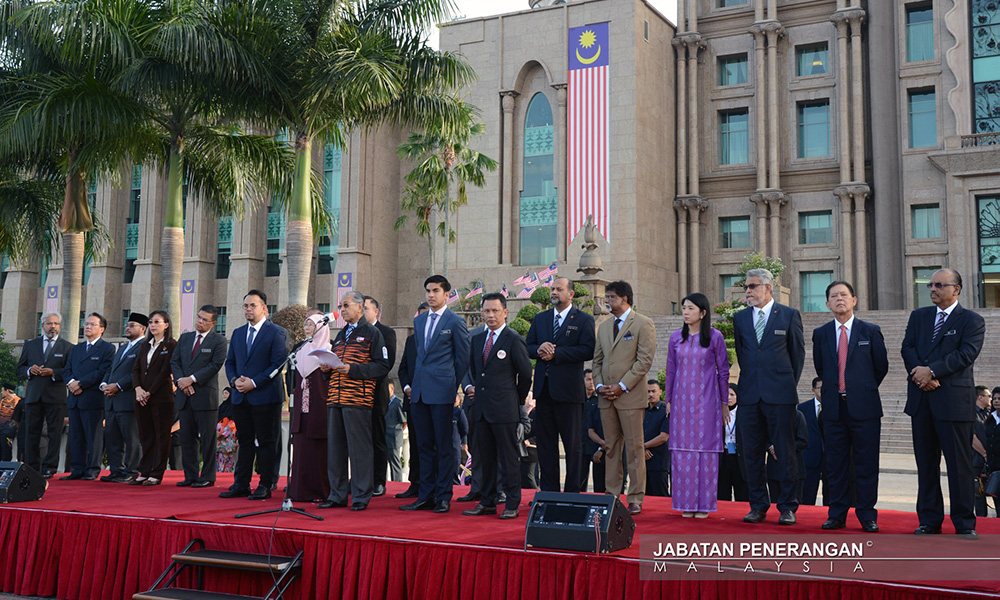
This is where the Najib administration has failed and Pakatan Harapan government can make a difference. Currently, open data is just one of the many responsibilities of Mampu, which in turn is just one of the many agencies under the bloated Prime Minister’s Department. Placing open data as such a low priority explains the lack of open data buy-in among government agencies.
We can look to our neighbours for guidance. Indonesia - which is ranked 38th in the Open Data Barometer, 15 places ahead of Malaysia - formed an open government national secretariat in 2015 that consists of officials from the Executive Office of the President, National Development Planning Ministry and Foreign Affairs Ministry.
The Filipinos, under the previous administration of Benigno Aquino III, created a task force comprising the Office of the Presidential Spokesperson, Budget and Management Department, and the Presidential Communications Development and Strategic Planning Office in 2013 to drive its open data policy. The Philippines is ranked 22nd in the Open Data Barometer, the highest in Southeast Asia.
Both our neighbours understand that the implementation of open data requires commitment and collaboration among government bodies at the highest level, hence the direct involvement of presidential office and multiple key government agencies in their open data initiatives.
Prioritising open data
If Malaysia were to achieve significant progress in its open data movement, the Pakatan Harapan government should elevate the priority of open data by forming a multi-ministry open data initiative led by a minister and tying it to his or her key performance index (KPI).
The step after that would be to include the principles of open data in the proposed FOIA. Such principles are missing from the two FOIAs enacted by the Selangor and Penang state governments. The two laws provide only the right to ask for public information but don't require the state government to proactively disclose information to the public.
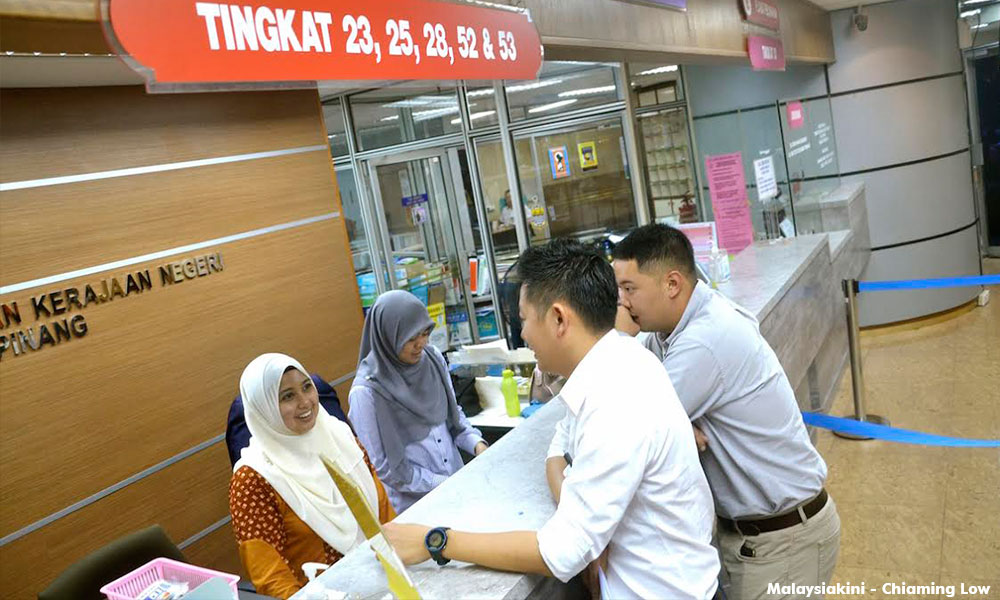
On the other hand, the Public Information Disclosure Act (the equivalent of FOIA) passed by the Indonesian government two decades ago in 2008, explicitly states that "public information shall be in nature open and accessible to public information users." It also stipulates that "every public agency is obliged to announce public information periodically." This effectively makes government data open by default without anyone asking for it.
Once an FOIA is in place, Malaysia would then be eligible to join the OGP. The membership would compel Malaysia to develop a national action plan with public consultation and commit to independent reporting on its progress.
A bottom-up approach
While the above steps are in the jurisdiction of the federal government, the new Pakatan Harapan state governments can drive open data through a bottom-up approach.
Local governments are a good starting point as they own most data that are closely related to our everyday lives.
Restaurant hygiene grades, pothole complaints and repair progress, local government budget and spending, and public parking and parking violation are some of the data that will attract strong interest and use from the public. Transparency through open data at local government level can be a viable launch pad for state-level politicians to enter national politics.

If done successfully, open data at local government could also set the bar for the federal government. One such example is New York City, a leader in the open data movement.
It passed an open data law in 2012 that mandates the city government to release all of its public data online by the end of this year. To push the envelope further, the law was amended later to compel regular examinations to be done on each city agency to verify that all eligible datasets have been disclosed.
The open data movement deserves immediate attention and action from the new government, not only because it can stimulate technology innovation and economic growth, but more importantly, it will be the catalyst to fundamentally transform the processes and culture in the civil service.
It aims to completely reverse the traditional bureaucratic, closed and rigid culture that breeds incompetency and corruption into one that embraces openness, civic participation and accountability.
This would be one of the most important legacies Pakatan Harapan can leave for Malaysians which cannot be easily erased.
KUEK SER KUANG KENG is an award-winning data journalist based in Kuala Lumpur. He is the founder of Data-N, a training program that helps newsrooms to integrate data journalism into daily reporting. He calls himself an open data advocate and would like to help the new government to implement its open data policy. Kuang Keng is also a proud Malaysiakini alumni. Email him at [email protected] or follow him on Twitter at @kuangkeng.
The views expressed here are those of the author/contributor and do not necessarily represent the views of Malaysiakini.

